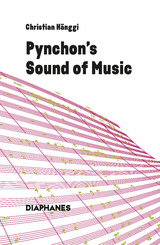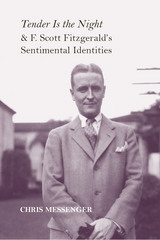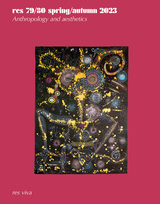3 books by Ngô, Christian

Hollywood in Cannes
The History of a Love-Hate Hate Relationship
Christian Jungen
Amsterdam University Press
Conjuring up all the glamour of the event, Jungen recounts the history of the Cannes Film Festival from an American perspective surveying the complex interplay of talent, money and corporate clout. He traces the growing influence of the Hollywood studios on the festival's rise to the key film event. Case studies of film (including The Birds, Easy Rider, and The Da Vinci Code) and of the creation of stars such as Arnold Schwarzenegger and Sharon Stone, profit from the author's experience of visiting the Cannes Film Festival over more than twelve years.
[more]

Pynchon’s Sound of Music
Christian Hänggi
Diaphanes, 2020
Pynchon's Sound of Music is dedicated to cataloging, exploring, and interpreting the manifold manifestations of music in Thomas Pynchon’s work. An original mix of close and distant readings, this monograph employs a variety of disciplines—from literary studies and musicology to philosophy, media theory, and history—to explain Pynchon through music and music through Pynchon. Encyclopedic and eclectic in its approach, Pynchon’s Sound of Music discusses the author’s use of instruments such as the kazoo, harmonica, and saxophone and embarks on close readings of the most salient and musically tantalizing passages. Zooming out to a bird’s eye view, Christian Hänggi puts Pynchon’s historical musical references and allusions into perspective to trace the trends and tendencies in the development of the author’s interest in music. A treasure trove for fans and an invaluable source for future scholarship, this book includes the Pynchon Playlist, a catalog of over 900 musical references in Pynchon’s oeuvre, and an exhaustive index of more than 700 appearances of musical instruments.
[more]

Tender Is the Night and F. Scott Fitzgerald's Sentimental Identities
Chris Messenger
University of Alabama Press, 2015
In this fascinating study, Chris Messenger posits F. Scott Fitzgerald as a great master of sentiment in modern American fiction. Sentimental forms both attracted and repelled Fitzgerald while defining his deepest impulses as a prose writer. Messenger demonstrates that the sentimental identities, refractions, and influences Fitzgerald explores in Tender Is the Night define key components in his affective life, which evolved into a powerful aesthetic that informed his vocation as a modernist writer.
In “Tender Is the Night” and F. Scott Fitzgerald’s Sentimental Identities, Messenger traces the roots of Fitzgerald’s writing career to the deaths of his two infant sisters a few months before his own birth. It was their loss, Fitzgerald wrote, that made him a writer. Messenger highlights how the loss of Fitzgerald’s siblings powerfully molded his relation to maternal nurturing and sympathy in Tender Is the Night as well as how it shaped the homosocial intimations of its care-giving protagonist, psychiatrist Dick Diver. A concomitant grief and mourning was fueled by Fitzgerald’s intimate and intense creative rivalry with his often-institutionalized wife, Zelda Sayre Fitzgerald.
While sentiment is a discredited strain in high modernism, Fitzgerald nevertheless embraced it in Tender Is the Night to fashion this most poignant and beautiful successor to The Great Gatsby. Fitzgerald’s aesthetic and emotional preoccupations came most vividly to life in this major novel. Messenger describes how Fitzgerald, creating his character Nicole Warren Diver as a victim of paternal incest, finally found the sentimental key to finishing his novel and uniting his vision of the two narratives of “saving” the two sisters and reimagining the agony of his wife and their marriage.
Fitzgerald’s productive quarrel with and through sentiment defines his career, and Messenger convincingly argues that Tender Is the Night should be placed alongside TheGreat Gatsby as a classic exemplar of the modern novel.
In “Tender Is the Night” and F. Scott Fitzgerald’s Sentimental Identities, Messenger traces the roots of Fitzgerald’s writing career to the deaths of his two infant sisters a few months before his own birth. It was their loss, Fitzgerald wrote, that made him a writer. Messenger highlights how the loss of Fitzgerald’s siblings powerfully molded his relation to maternal nurturing and sympathy in Tender Is the Night as well as how it shaped the homosocial intimations of its care-giving protagonist, psychiatrist Dick Diver. A concomitant grief and mourning was fueled by Fitzgerald’s intimate and intense creative rivalry with his often-institutionalized wife, Zelda Sayre Fitzgerald.
While sentiment is a discredited strain in high modernism, Fitzgerald nevertheless embraced it in Tender Is the Night to fashion this most poignant and beautiful successor to The Great Gatsby. Fitzgerald’s aesthetic and emotional preoccupations came most vividly to life in this major novel. Messenger describes how Fitzgerald, creating his character Nicole Warren Diver as a victim of paternal incest, finally found the sentimental key to finishing his novel and uniting his vision of the two narratives of “saving” the two sisters and reimagining the agony of his wife and their marriage.
Fitzgerald’s productive quarrel with and through sentiment defines his career, and Messenger convincingly argues that Tender Is the Night should be placed alongside TheGreat Gatsby as a classic exemplar of the modern novel.
[more]
READERS
Browse our collection.
PUBLISHERS
See BiblioVault's publisher services.
STUDENT SERVICES
Files for college accessibility offices.
UChicago Accessibility Resources
home | accessibility | search | about | contact us
BiblioVault ® 2001 - 2024
The University of Chicago Press









